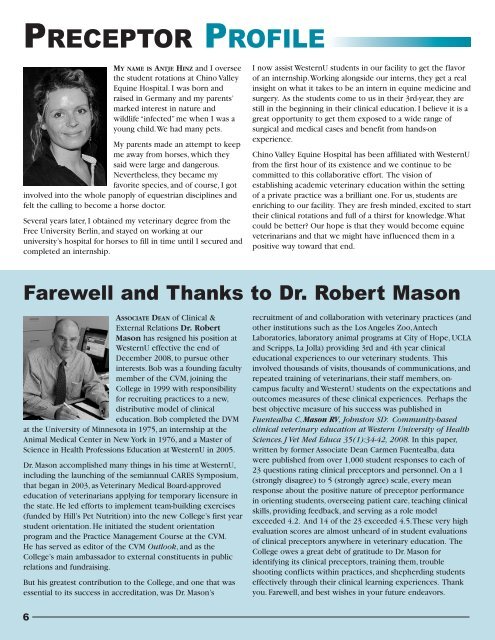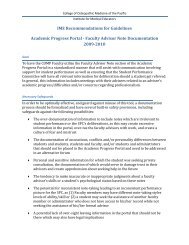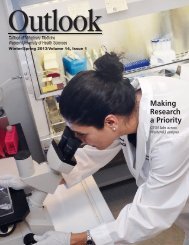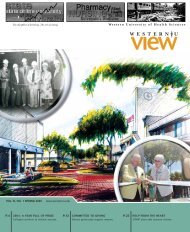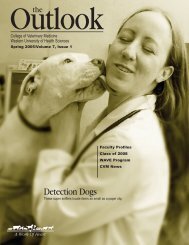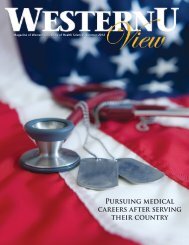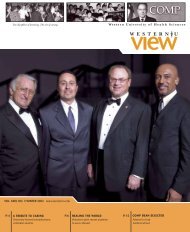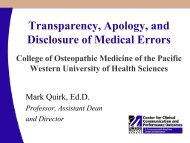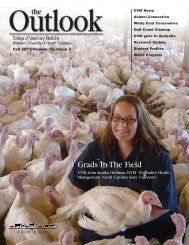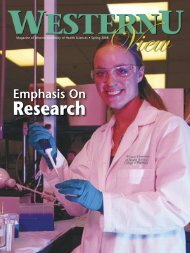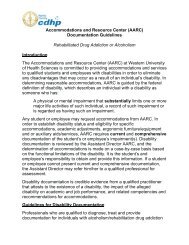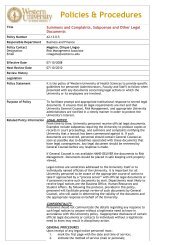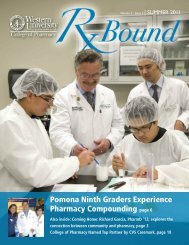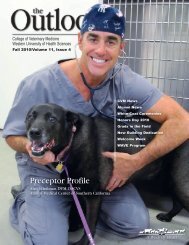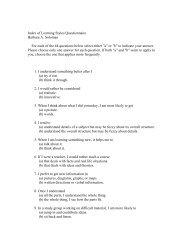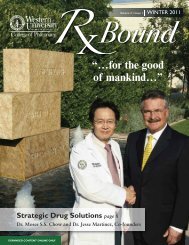College of Veterinary Medicine Western University of Health Sciences
College of Veterinary Medicine Western University of Health Sciences
College of Veterinary Medicine Western University of Health Sciences
You also want an ePaper? Increase the reach of your titles
YUMPU automatically turns print PDFs into web optimized ePapers that Google loves.
PRECEPTOR PROFILE<br />
MY NAME IS ANTJE HINZ and I oversee<br />
the student rotations at Chino Valley<br />
Equine Hospital. I was born and<br />
raised in Germany and my parents’<br />
marked interest in nature and<br />
wildlife “infected” me when I was a<br />
young child.We had many pets.<br />
My parents made an attempt to keep<br />
me away from horses, which they<br />
said were large and dangerous.<br />
Nevertheless, they became my<br />
favorite species, and <strong>of</strong> course, I got<br />
involved into the whole panoply <strong>of</strong> equestrian disciplines and<br />
felt the calling to become a horse doctor.<br />
Several years later, I obtained my veterinary degree from the<br />
Free <strong>University</strong> Berlin, and stayed on working at our<br />
university’s hospital for horses to fill in time until I secured and<br />
completed an internship.<br />
I now assist <strong>Western</strong>U students in our facility to get the flavor<br />
<strong>of</strong> an internship.Working alongside our interns, they get a real<br />
insight on what it takes to be an intern in equine medicine and<br />
surgery. As the students come to us in their 3rd-year, they are<br />
still in the beginning in their clinical education. I believe it is a<br />
great opportunity to get them exposed to a wide range <strong>of</strong><br />
surgical and medical cases and benefit from hands-on<br />
experience.<br />
Chino Valley Equine Hospital has been affiliated with <strong>Western</strong>U<br />
from the first hour <strong>of</strong> its existence and we continue to be<br />
committed to this collaborative effort. The vision <strong>of</strong><br />
establishing academic veterinary education within the setting<br />
<strong>of</strong> a private practice was a brilliant one. For us, students are<br />
enriching to our facility. They are fresh minded, excited to start<br />
their clinical rotations and full <strong>of</strong> a thirst for knowledge.What<br />
could be better Our hope is that they would become equine<br />
veterinarians and that we might have influenced them in a<br />
positive way toward that end.<br />
Farewell and Thanks to Dr. Robert Mason<br />
ASSOCIATE DEAN <strong>of</strong> Clinical &<br />
External Relations Dr. Robert<br />
Mason has resigned his position at<br />
<strong>Western</strong>U effective the end <strong>of</strong><br />
December 2008, to pursue other<br />
interests. Bob was a founding faculty<br />
member <strong>of</strong> the CVM, joining the<br />
<strong>College</strong> in 1999 with responsibility<br />
for recruiting practices to a new,<br />
distributive model <strong>of</strong> clinical<br />
education. Bob completed the DVM<br />
at the <strong>University</strong> <strong>of</strong> Minnesota in 1975, an internship at the<br />
Animal Medical Center in New York in 1976, and a Master <strong>of</strong><br />
Science in <strong>Health</strong> Pr<strong>of</strong>essions Education at <strong>Western</strong>U in 2005.<br />
Dr. Mason accomplished many things in his time at <strong>Western</strong>U,<br />
including the launching <strong>of</strong> the semiannual CARES Symposium,<br />
that began in 2003, as <strong>Veterinary</strong> Medical Board-approved<br />
education <strong>of</strong> veterinarians applying for temporary licensure in<br />
the state. He led efforts to implement team-building exercises<br />
(funded by Hill’s Pet Nutrition) into the new <strong>College</strong>’s first year<br />
student orientation. He initiated the student orientation<br />
program and the Practice Management Course at the CVM.<br />
He has served as editor <strong>of</strong> the CVM Outlook, and as the<br />
<strong>College</strong>’s main ambassador to external constituents in public<br />
relations and fundraising.<br />
But his greatest contribution to the <strong>College</strong>, and one that was<br />
essential to its success in accreditation, was Dr. Mason’s<br />
recruitment <strong>of</strong> and collaboration with veterinary practices (and<br />
other institutions such as the Los Angeles Zoo,Antech<br />
Laboratories, laboratory animal programs at City <strong>of</strong> Hope, UCLA<br />
and Scripps, La Jolla) providing 3rd and 4th year clinical<br />
educational experiences to our veterinary students. This<br />
involved thousands <strong>of</strong> visits, thousands <strong>of</strong> communications, and<br />
repeated training <strong>of</strong> veterinarians, their staff members, oncampus<br />
faculty and <strong>Western</strong>U students on the expectations and<br />
outcomes measures <strong>of</strong> these clinical experiences. Perhaps the<br />
best objective measure <strong>of</strong> his success was published in<br />
Fuentealba C, Mason RV, Johnston SD: Community-based<br />
clinical veterinary education at <strong>Western</strong> <strong>University</strong> <strong>of</strong> <strong>Health</strong><br />
<strong>Sciences</strong>. J Vet Med Educa 35(1):34-42, 2008. In this paper,<br />
written by former Associate Dean Carmen Fuentealba, data<br />
were published from over 1,000 student responses to each <strong>of</strong><br />
23 questions rating clinical preceptors and personnel. On a 1<br />
(strongly disagree) to 5 (strongly agree) scale, every mean<br />
response about the positive nature <strong>of</strong> preceptor performance<br />
in orienting students, overseeing patient care, teaching clinical<br />
skills, providing feedback, and serving as a role model<br />
exceeded 4.2. And 14 <strong>of</strong> the 23 exceeded 4.5.These very high<br />
evaluation scores are almost unheard <strong>of</strong> in student evaluations<br />
<strong>of</strong> clinical preceptors anywhere in veterinary education. The<br />
<strong>College</strong> owes a great debt <strong>of</strong> gratitude to Dr. Mason for<br />
identifying its clinical preceptors, training them, trouble<br />
shooting conflicts within practices, and shepherding students<br />
effectively through their clinical learning experiences. Thank<br />
you. Farewell, and best wishes in your future endeavors.<br />
6


